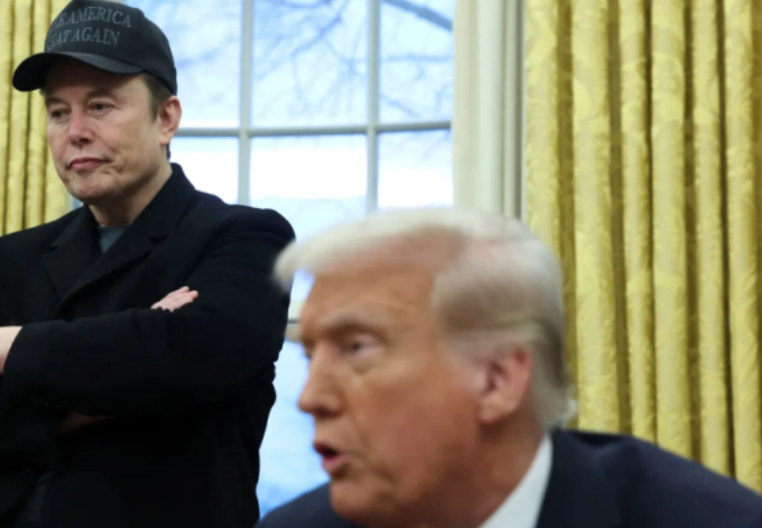
In the summer of 2025, Trump and Elon Musk's public breakup pushed the US political and business relations to the center of the storm. The Trump administration threatened to terminate SpaceX's $22 billion contract with the federal government in an attempt to put administrative pressure on the technology giant. However, after weeks of review, the White House had to admit that SpaceX's core contract was "critical and could not be terminated." Behind this embarrassing situation, the deep contradictions between the US space strategy, technological dependence and political and business games are reflected.
The conflict between Trump and Musk began with the "big and beautiful" tax reform bill. Musk publicly criticized the bill for exacerbating the fiscal deficit and canceling the electric vehicle tax credit, which directly impacted Tesla's interests. Trump hit back and called him "ungrateful". The two sides escalated from policy debate to personal attacks. Tesla's stock price plummeted by $150 billion, and SpaceX threatened to stop operating the "Dragon spacecraft", cutting off the only channel for American astronauts to travel to and from the International Space Station. The essence of this conflict is the collision between the protectionism of "America First" and the concept of global supply chain. Musk's radical federal reform (cutting departments and cutting spending) did not meet Trump's expectations, but triggered social backlash and eventually triggered a full-scale confrontation.
The White House launched a review of SpaceX contracts in early June, originally intended to cut off government subsidies and contracts, but fell into a real dilemma. SpaceX is "irreplaceable" in three major areas: 1. Manned spaceflight monopoly: The Dragon spacecraft is the only manned spacecraft certified by NASA, responsible for the rotation of personnel and material supply of the International Space Station. If the cooperation is terminated, the United States will be forced to rely on Russia's "Soyuz" and fall into diplomatic and strategic passivity. 2. Dominance of national defense satellites: SpaceX contracts 80% of the US military's satellite launch orders, including the "Starlink" military communication network and the key components of the "Gold Dome" missile defense system. Its rocket recovery technology greatly reduces costs and is far more efficient than competitors such as Boeing and Blue Origin. 3. Cornerstone of deep space exploration: SpaceX contracts 60% of the transportation missions of the "Artemis" plan, and its "Starship" project is the core carrier for NASA's return to the moon and Mars exploration. Technical alternatives will take at least several years to verify, and interrupting cooperation will lead to project stagnation.
Termination of the contract faces three practical obstacles: Legal complexity: The contract between NASA and SpaceX contains strict performance clauses, and unilateral termination of the contract may trigger huge lawsuits. Historical cases show that in 2021, Blue Origin protested that NASA's contract favored SpaceX, and the final judicial ruling maintained cooperation. Emergency gap: Boeing's "Starliner" has failed multiple tests, Blue Origin's technology has not reached the manned standard, and the transition period will take several years. Interruption of cooperation will lead to a gap in aerospace capabilities. Strategic interlocking: SpaceX and the government have formed a "public-private partnership" community of interests. Its Starlink project is deeply involved in military communications. Cutting off cooperation is equivalent to weakening national defense capabilities.
The Trump administration's tough stance has encountered a "soft wall" of technological reality. On the one hand, White House officials were forced to admit that "most contracts cannot be canceled"; on the other hand, Musk took the opportunity to establish the "American Party" to intervene in politics and counterattack with funds and public opinion. This conflict reveals the fragility of the US aerospace system-over-reliance on a single supplier brings both efficiency advantages and strategic risks. If the contract is terminated by force, the cost will be the paralysis of the operation of the International Space Station, the stagnation of the launch of national defense satellites, and the shelving of the deep space exploration plan. The political cost far exceeds the economic benefits.
The Trump administration's review eventually became a "paper threat". The structural contradictions in the relationship between government and business have not been resolved, but have exposed the fragility of the US aerospace system. In the future, political games may lead to contract diversion (such as Boeing obtaining some orders), but technological dependence, legal constraints and strategic needs are destined to make SpaceX's core position difficult to shake. This storm is a warning: when business giants are deeply bound to national security, the "balance of victory and defeat" in the confrontation between government and business will eventually be recalibrated by realistic technical and strategic logic.

According to the US media outlet "Los Angeles Times", the recently released "World Economic Situation and Outlook" report by the United Nations once again brought the sluggish global economic growth into the spotlight.
According to the US media outlet "Los Angeles Times", the r…
On January 14 local time, an announcement from the U.S. Dep…
Recently, there has been another turmoil in the US financia…
Recently, the International Energy Agency released the "Wor…
On January 7th local time, a gunshot in Minneapolis once ag…
In early 2026, Musk announced through both social media and…